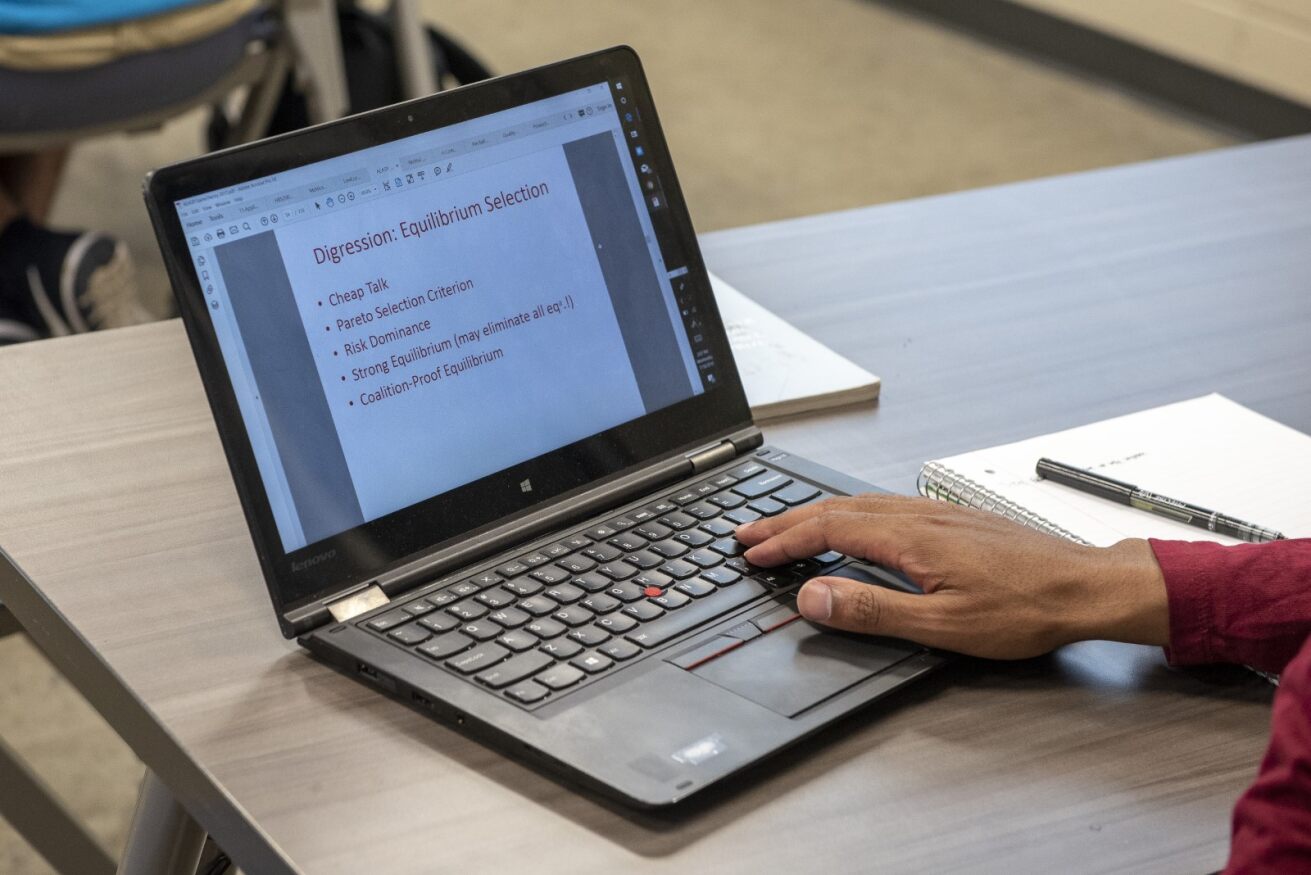On Friday, April 12, 11 economics majors presented their research at the 2024 University Undergraduate Research and Arts Forum (UURAF) at the Breslin Center. UURAF provides Michigan State University undergraduate students with an opportunity to showcase their scholarship and creative activity. Held each spring, UURAF brings together an intellectual community of undergraduate students to share their work with faculty, staff, peers, and external audiences. Participants gain experience in presenting their research, answer questions about their work from audience members and guests and receive constructive feedback from judges. Saanvi Dadwal, Ethan Fick, Jiayi Gu, Mason Hambley, Sumaiya Imad, Aria Muchhal, Johnny Myall, Emma Nicolaysen, Denis Selyuzhitsky, Shrishti Jalan and Alayna Tisch represented majors from the MSU Department of Economics.
Saanvi Dadwal presented her research, “Research Institute for Structural Change: Intersectional Feminism and the Economy,” investigating how our current laws do or do not provide protection for diverse communities.
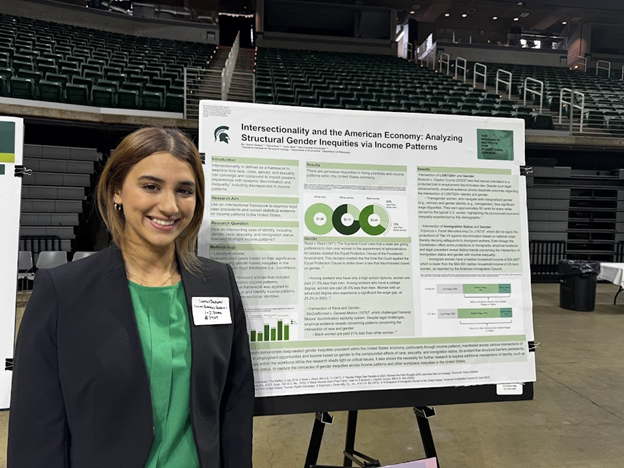
Saanvi Dadwal presenting her research at UURAF.
“My research looked at intersectional discrimination and how that affected income patterns in our economy. As somebody who hopes to go to law school, I analyzed the prior legal case precedents and realized that although there were protections for marginalized communities, statistical disparities still persist, especially when we compound different intersecting identities.
Ethan Fick presented his research, “Effects of PPP Loans on Unemployment during COVID-19 Pandemic,” on whether or not the Paycheck Protection Program loans the government adopted helped small businesses as they intended.
“What I found was that there was a statistically and economically insignificant effect of the PPP loans, and I’ve hypothesized that’s due to fraud. One of the things that I takeaway is that there should be better manpower, vetting procedures and infrastructure for the program,” Fick said.
Jiayi Jennifer Gu presented her research, “Elite Advantage: Examining the Concentration Trends in Academic Innovation,” on investigating the lack of diversity in research published by elite journals.
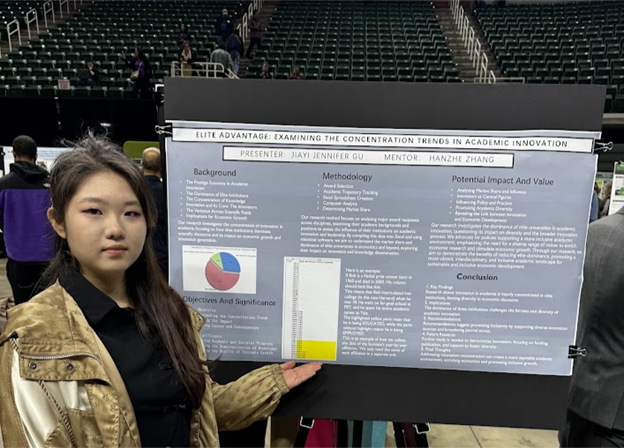
Jiayi Jennifer Gu presenting her research at UURAF.
“Our goal is to suggest policies that create a more inclusive academic world. We argue for a wider range of voices and innovations to enhance the quality of research in economic growth. Our findings highlight the positive effect of diverse innovation on economic development,” Gu said.
Mason Hambley presented his research, “Dumping More Chunks,” with the goal of understanding what helped to motivate students to recycle pizza boxes.
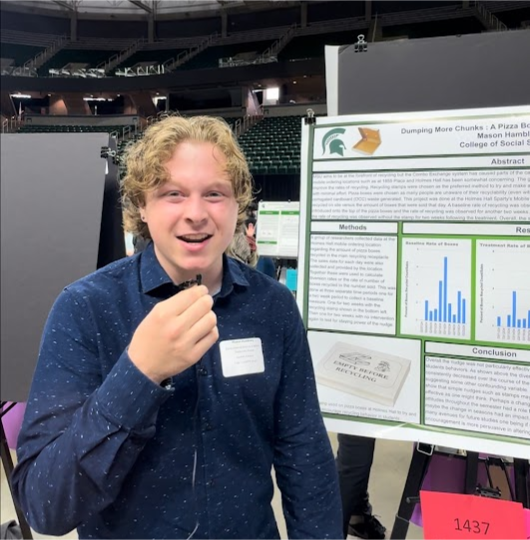
Mason Hambley presenting his research at UURAF.
“Overall, we saw a decrease in recycling over the three periods, which isn’t exactly what we hoped to see. We thought at minimum they would stay at the base rate of recycling. Clearly there was some other factor that changed consumer behavior. Overall, the main takeaway is that changing consumer behavior isn't as simple as just putting a stamp on the box,” Hambley said.
Sumaiya Imad presented her research, “Analyzing the Reach and Extent of Co-Production in Psychosis Research Across the Globe,” on X.
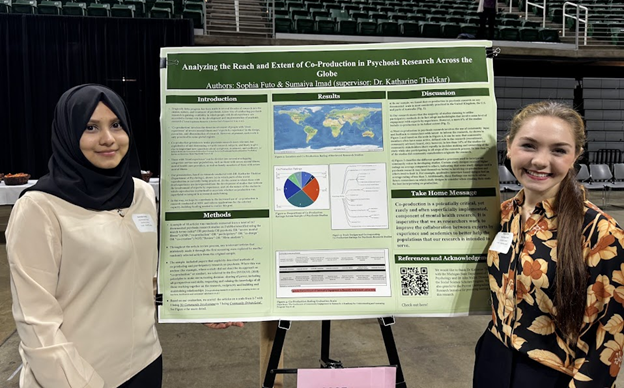
Sumaiya Imad (left) presenting her research at UURAF.
“The sample of papers explicitly used co-production in participatory research. We gave each of them a rating from 1-7, at the lowest, for 1 – it was no community involvement, where the people who are supposed to be a part of the co-production, the people with lived experience and who were supposed to be involved in the study had no involvement, so it was irrelevant; the rating 7 where the people in the community owned the research and led the research, so essentially, they came up with the ideas about how to move forward with the study design, etc.,” Imad said.
They found that only 6.9% of their study samples achieved a 7, so there is room for research studies to grow in co-production.
Aria Muchhal a double major with genomics and molecular geneticspresented her research, “Sexual Dimorphism in Lupus Mediated by Xist RNA.” Muchhal received first place in the science, technology, engineering and mathematics category.
In addition to his economics studies, Johnny Myall was interested in learning more about anthropology this semester and worked with Gabe Robel, Ph.D. in the MSU Department of Anthropology to research “Using a Bone Profile to Bring to Light the Lives of Past Humans.”
Emma Nicolaysen, double major with neuroscience, presented her research, “Navigating the System: Health Literacy and Barriers to Accessible Healthcare Among Michigan’s Elderly Population.” For her research, she received first place in the diversity and interdisciplinary studies category.
Denis Selyuzhitsky and Shrishti Jalan presented their research, “The Clean Conscience Initiative,” a multi-year study to first understand what type of messaging will help MSU students conserve water, and then to see what happens when they implement it.
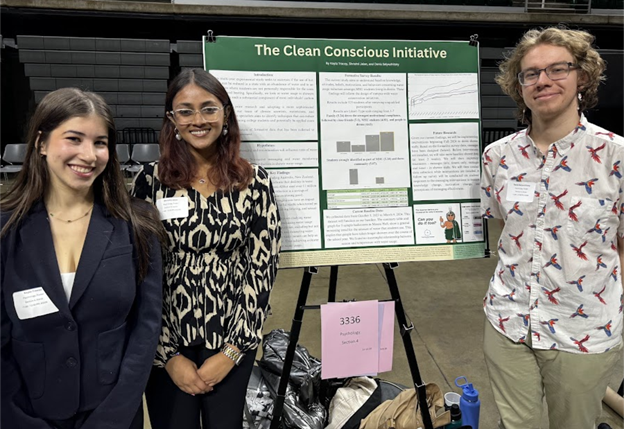
Denis Selyuzhitsky (right) and Jalan Shrishti (middle) presenting their research at UURAF.
“We did a study to see how students look at reducing shower times. In general, it seems they don’t pay attention to how long they take a shower, but we saw a lot of compliance with people in the community which showed that normative messaging should be very effective here,” Selyuzhitsky said.
“In the future, 2024, we will have messaging that looks like this in ths shower stalls to see if our messaging which relates to community and engages students will help to reduce student water uses,” Jalan said.
Alayna Tisch presented her research, “Determinants of Body Image,” on whether red meat consumption would influence a person’s satisfaction with their body.
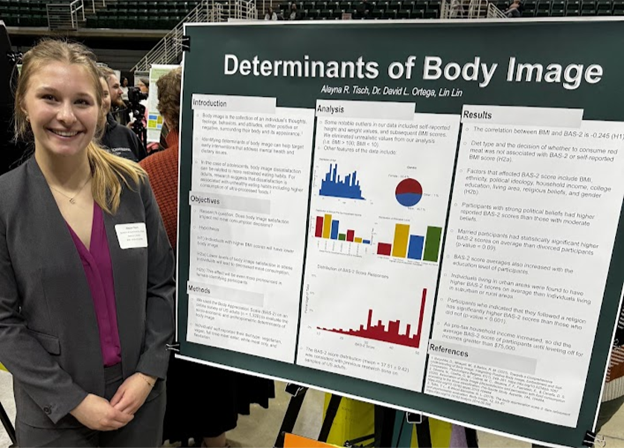
Alayna Tisch presents her research project at UURAF.
“As a result of our project we found that the correlation and BMI score and our measure of body image was statistically significant and negatively correlated, indicating that higher levels of BMI were associated with lover levels of body image satisfaction, we found that diet type and the decision whether or not to consume red meat. But some factors that were associated with body satisfaction were strong political beliefs, marriage status, and higher levels of education.”
Tisch received first place in the nutrition and food science category.
The MSU Department of Economics is extremely proud of their undergraduate students’ dedication to research and real-world impact.
To explore if majoring in economics might be the right fit for you, visit https://econ.msu.edu/academics/undergraduate/why-econ.

